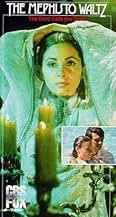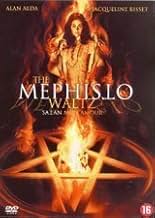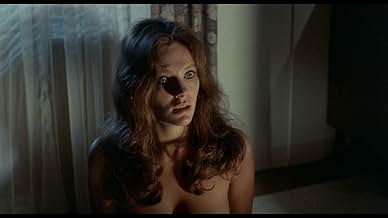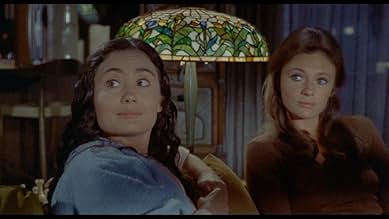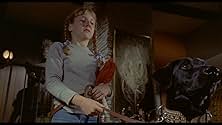VALUTAZIONE IMDb
6,1/10
3460
LA TUA VALUTAZIONE
Aggiungi una trama nella tua linguaAn old, dying satanist arranges to transfer his soul into the body of a young concert pianist.An old, dying satanist arranges to transfer his soul into the body of a young concert pianist.An old, dying satanist arranges to transfer his soul into the body of a young concert pianist.
- Regia
- Sceneggiatura
- Star
- Premi
- 1 candidatura in totale
Bradford Dillman
- Bill Delancey
- (as Brad Dillman)
Curd Jürgens
- Duncan Ely
- (as Curt Jurgens)
Berry Kroeger
- Raymont
- (as Barry Kroeger)
Terrence Scammell
- Richard
- (as Terence Scammell)
Leon Alton
- Pallbearer
- (non citato nei titoli originali)
Antoinette Bower
- Member of Ely's Group
- (non citato nei titoli originali)
Recensioni in evidenza
It is important in film-making not only create an impression but also to engender some sort of gut reaction from the audience, especially in horror films. We can judge a horror film in addition to its style, by its ability to actually frighten. THE MEPHISTO WALTZ does well on this count.
The film is about a couple who is coerced into the household of rich socialite-Satanists, led by Duncan Ely, who is played by Curt Jurgens, who is pretty good here. What follows is a deadly game of cat-and-mouse between the converted and unconverted to Ely's sect. It is pretty well-written and shot, with genuine suspense and a deceptively simple use of oblique angles and soft focus to create a nightmarish atmosphere. The problem with the film is that it is too long, and domestic sequences are not poignant enough to be interesting, despite the strange Alda performance.
However, there are scary sequences of fantasy vs. reality and terror-based ideas, such as Jaquelin Bisset's realization that her dreams are reality and the pure horror of the dog attack scene. Initially director Paul Wendkos's inserts seem too jarring, but in being jarring they make the action more threatening.
I didn't really like the title sequence because it gives away too many of the nice shots we should be surprised or thrilled by later in the film. One thing that definitely adds to the suspense of the film is Jerry Goldsmith's score: it rivals Herrman's PSYCHO score for violin-fueled, full-blooded accompaniment to a horror film.
Overall, despite some problems of character development and loose ends, THE MEPHISTO WALTZ is a frightening film, and a devious twist on a concept used in such other films as THE SEVENTH VICTIM and ROSEMARY'S BABY, this one is a distinctive experience in the bizarre. Some may not like the plot's convolution, but assuredly watch if you are a fan of horror films of any connotation.
The film is about a couple who is coerced into the household of rich socialite-Satanists, led by Duncan Ely, who is played by Curt Jurgens, who is pretty good here. What follows is a deadly game of cat-and-mouse between the converted and unconverted to Ely's sect. It is pretty well-written and shot, with genuine suspense and a deceptively simple use of oblique angles and soft focus to create a nightmarish atmosphere. The problem with the film is that it is too long, and domestic sequences are not poignant enough to be interesting, despite the strange Alda performance.
However, there are scary sequences of fantasy vs. reality and terror-based ideas, such as Jaquelin Bisset's realization that her dreams are reality and the pure horror of the dog attack scene. Initially director Paul Wendkos's inserts seem too jarring, but in being jarring they make the action more threatening.
I didn't really like the title sequence because it gives away too many of the nice shots we should be surprised or thrilled by later in the film. One thing that definitely adds to the suspense of the film is Jerry Goldsmith's score: it rivals Herrman's PSYCHO score for violin-fueled, full-blooded accompaniment to a horror film.
Overall, despite some problems of character development and loose ends, THE MEPHISTO WALTZ is a frightening film, and a devious twist on a concept used in such other films as THE SEVENTH VICTIM and ROSEMARY'S BABY, this one is a distinctive experience in the bizarre. Some may not like the plot's convolution, but assuredly watch if you are a fan of horror films of any connotation.
Quinn Martin Productions venture into theatrical films as opposed to its television work is a tidy little entry in the Satanic genre which the late 1960s and early 1970s were chock full of and it is sad that we do not see such films today.
The stunning beauty Barbara Parkins and the irrepressible Curt Jürgens steal the show and turn in performances that dwarf the rest of the cast. This is a low budget film and yet without all of today's special effects it is readily more thrilling and frightening than the typical horror film of contemporary American film.
Thank heavens it is on DVD I saw it originally and now eagerly seek to have it for my collection.
The stunning beauty Barbara Parkins and the irrepressible Curt Jürgens steal the show and turn in performances that dwarf the rest of the cast. This is a low budget film and yet without all of today's special effects it is readily more thrilling and frightening than the typical horror film of contemporary American film.
Thank heavens it is on DVD I saw it originally and now eagerly seek to have it for my collection.
Whatever moral issues exist in this strange tale of the occult, they vanish as soon as you accept the premise of this story--that a woman would kill another to repossess her husband with both of them in the guise of someone else's body!! It's about as weird as any Tales from the Crypt!
On the plus side, all of it is stylishly photographed and played with a certain amount of relish, at least by Jacqueline Bisset, Curt Jurgens and Bradford Dillman. Biggest flaw is casting Alan Alda in the central role as the pianist who inherits the musical talent of Curt Jurgens when the Satanist dies, bequeathing Alda with his body and soul. Bisset is the wife who slowly comes to suspect that her husband has been taken over by someone else.
Not quite as strikingly original as "Rosemary's Baby", it does have some effective horror moments, notably involving scenes with a rather ferocious black dog and a scene where the Devil is summoned but we never actually see him. Imagination is given free reign here (at least fleetingly), shades of Val Lewton. Perhaps a technique that should have been used more often throughout.
None of it quite makes sense and the ending is a distinct letdown, but there are some chilling moments nevertheless. Bisset and Parkins are beautifully photographed, with Bisset coming out ahead in the acting department, playing the stressed out wife with appropriate fear and tension. Parkins, on the other hand, seems to rely on one frozen expression, sleepwalking through her role, relying solely on her looks to get by in a way that Hedy Lamarr was often accused of doing in films of the '40s.
As for Alan Alda, he is much too bland, lending neither interest nor credibility to a role that demands a strong romantic lead. His career suggests that he is clearly more comfortable in character roles requiring comic flair, not straight dramatic parts. Bradford Dillman is at least a stronger presence in a lesser role.
All in all, not bad for watching when you're in the mood for a tale of the occult. I seem to recall enjoying the book years ago and the film doesn't quite measure up. It emerges as one of those films that could have been much more satisfying with better casting and direction.
On the plus side, all of it is stylishly photographed and played with a certain amount of relish, at least by Jacqueline Bisset, Curt Jurgens and Bradford Dillman. Biggest flaw is casting Alan Alda in the central role as the pianist who inherits the musical talent of Curt Jurgens when the Satanist dies, bequeathing Alda with his body and soul. Bisset is the wife who slowly comes to suspect that her husband has been taken over by someone else.
Not quite as strikingly original as "Rosemary's Baby", it does have some effective horror moments, notably involving scenes with a rather ferocious black dog and a scene where the Devil is summoned but we never actually see him. Imagination is given free reign here (at least fleetingly), shades of Val Lewton. Perhaps a technique that should have been used more often throughout.
None of it quite makes sense and the ending is a distinct letdown, but there are some chilling moments nevertheless. Bisset and Parkins are beautifully photographed, with Bisset coming out ahead in the acting department, playing the stressed out wife with appropriate fear and tension. Parkins, on the other hand, seems to rely on one frozen expression, sleepwalking through her role, relying solely on her looks to get by in a way that Hedy Lamarr was often accused of doing in films of the '40s.
As for Alan Alda, he is much too bland, lending neither interest nor credibility to a role that demands a strong romantic lead. His career suggests that he is clearly more comfortable in character roles requiring comic flair, not straight dramatic parts. Bradford Dillman is at least a stronger presence in a lesser role.
All in all, not bad for watching when you're in the mood for a tale of the occult. I seem to recall enjoying the book years ago and the film doesn't quite measure up. It emerges as one of those films that could have been much more satisfying with better casting and direction.
At least two people below comment on the frequent appearance of the boom mike in this film. To clarify, that is the fault of the TV company / Video company for screening the film in the wrong aspect ratio. It is not the fault of the filmmakers. If you saw this film in the cinema there would be no boom mike since the top of the frame would be masked off by the lens gate. The TV company is showing you the full frame of the picture which should not be all visible to the audience.
Another variation on the damnation of Faust ,this waltz borrows from "mad love" -particularly the French version ("the hands of Orlac" ) starring Mel Ferrer as a pianist -and mainly from Levin's "Rosemary's baby" :the new friends whom the husband (Alda) find nice and helpful whereas the wife finds them intrusive :the "bargain " is even worse than in Polanski's movie.
The "supernatural " scenes are not convincing (nothing to match Rosemary's nightmare) ,but Jacqueline Bisset is an excellent actress (on the other hand ,Alan Alda is inexpressive, the changing in his personality does not really show) who carries the movie on her shoulders, and she gets strong support from Barbara Perkins as disturbing Roxanne and seasoned German actor Curd Jurgens.
Add a good final twist : you do not realize at once what really happened.
The "supernatural " scenes are not convincing (nothing to match Rosemary's nightmare) ,but Jacqueline Bisset is an excellent actress (on the other hand ,Alan Alda is inexpressive, the changing in his personality does not really show) who carries the movie on her shoulders, and she gets strong support from Barbara Perkins as disturbing Roxanne and seasoned German actor Curd Jurgens.
Add a good final twist : you do not realize at once what really happened.
Lo sapevi?
- QuizHas the singular distinction of being the only theatrical film produced by Twentieth Century-Fox during the entire calendar year of 1970, this due to financial reversals incurred by the studio when several of its recent films failed at the box office.
- BlooperAt various points during the film, the demonic potion bottle varies between a clear glass bottle partially filled with blue liquid and a blue glass bottle in which the liquid cannot be seen.
- Citazioni
Duncan Ely: People should be born at the age of 70 and live their life backwards.
- Versioni alternativeAn alternate cut of The Mephisto Waltz ran on the Flix network in the early-mid 2000s. This version includes two memorable differences: a much longer floor shot close up of the Doberman's head wearing the Halloween mask, and a shot of Satan's hooves when he visits Paula Clarkson (Jacqueline Bisset) during her Satanic ritual.
- ConnessioniFeatured in Cinemacabre TV Trailers (1993)
I più visti
Accedi per valutare e creare un elenco di titoli salvati per ottenere consigli personalizzati
- How long is The Mephisto Waltz?Powered by Alexa
Dettagli
- Data di uscita
- Paese di origine
- Lingue
- Celebre anche come
- The Mephisto Waltz
- Luoghi delle riprese
- Avenue of the Stars, Century City, Los Angeles, California, Stati Uniti(Paula Clarkson walking over bridge in Century City)
- Azienda produttrice
- Vedi altri crediti dell’azienda su IMDbPro
- Tempo di esecuzione1 ora 55 minuti
- Colore
- Proporzioni
- 1.85 : 1
Contribuisci a questa pagina
Suggerisci una modifica o aggiungi i contenuti mancanti

Divario superiore
By what name was La macchia della morte (1971) officially released in India in English?
Rispondi



